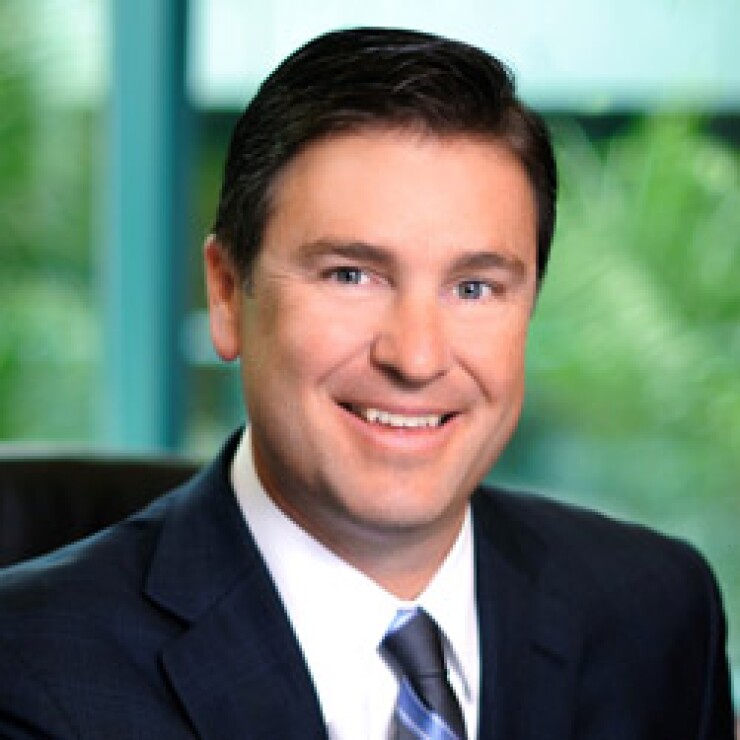
Reverse mortgages still have a bright future even as another large originator, Generation Mortgage, has decided to stop making them.
Firms that have exited the Home Equity Conversion Mortgage business blamed regulatory and reputational risks. Lenders have found themselves forced to close on HECM borrowers for not paying their taxes and insurance. More recently, lenders have come under fire for demanding repayment from nonborrower spouses when borrowers die.
"It's always unfortunate for an industry when somebody gets out," Rob Katz, the executive vice president of ReverseVision, a technology provider with offices in San Diego and Raleigh, N.C., said in an interview during the Mortgage Bankers Association Annual Convention in Las Vegas.
But his firm's clients generally have embraced the regulatory changes in the product, especially the new rules going forward on the nonborrowing spouse, he said. (Generation was not a ReverseVision client.)
"Pretty much everybody in the industry agrees it is the right thing to do to help counter the problems that lead reverse mortgages to have a bad reputation," Katz said, adding that every change the Department of Housing and Urban Development has ordered for the HECM is in direct response to a perception problem with the loan product.
Rather than bolting new compliance rules to the HECM, HUD is looking at the product, learning what the issues are, and then making tweaks.
What made Generation's decision to exit reverse mortgage originations (it will remain a servicer) shocking is that just a couple of months earlier it had made some major additions to its sales team.
In an email interview with National Mortgage News, the Atlanta-based firm's president and chief executive, Colin Cushman, said: "Recent regulatory changes led to a reduction in number of units across the reverse mortgage industry. We have also seen a reduction in loan balances, significantly reducing origination revenues while increasing expenses.
"Unfortunately, despite our sales team's ongoing efforts, these effects made the decision inevitable for our company."
Through the end of September, Generation originated approximately 1,800 loans.
Generation said it reduced its staff, but it declined to be more specific about how many jobs were lost.
While the HECM has been the dominant reverse mortgage product for many years, there have been varying attempts at both a conforming (from Fannie Mae) and proprietary reverse mortgage. Neither version has gained any traction.
But people keep trying. There are some proprietary reverse mortgage products either currently available or soon to be available, Katz said. He is interested in seeing if a securitization market develops for these noninsured products.
"That is kind of the big mystery out there: is there an appetite (from investors) for these or not?" he said.
There is a securitization market for the HECM created by Ginnie Mae.
Generation's departure from the reverse business was "unfortunate," Katz said, but ReverseVision is bullish about the future of the HECM.
The vast majority of HECM originations go through the company's software, he said.
"We are seeing month-over-month 4% to 5% increases in loan applications being taken and loan closings," Katz said. "It has been for the past nine months a steady month-over-month increase in volume of both. It is not going in the wrong direction; it is going in the right direction."
ReverseVision has added several new clients recently, including Bank of New York Mellon, which is re-entering this space, this time as an aggregator of closed loans. These additions outweigh the number of firms dropping reverse mortgages.
Orange, Calif.-based appraisal management company LRES is now doing a lot of reverse mortgage appraisals, its CEO Roger Beane said in an interview during MBA. All of HUD's 2014 tweaking of the HECM will have taken full effect by 2015. So next year lenders will see the impact of those changes on their business, he said.
It had a big effect on the HECM market share when Bank of America and Wells Fargo stopped originating these loans. "I think it's going to take a B of A or Wells or somebody [of that size] to come back in" to move the product to a larger percentage of the origination business, Beane said.
"The population of our country is obviously growing in age, and a product is going to have to be there because our seniors, they've got equity in their homes but may not have the means to support themselves without taking that equity. So this product, I think, is going to be a viable product for the next several years for the right borrower," he declared.
But right now others are not following BNY Mellon's path back into the business. The reputational and regulatory risk, at least as it stands today, outweigh the potential growth of the market.
Generation is keeping its hand in the game by retaining its servicing business (although it does not plan to purchase servicing from other HECM originators).
When asked if circumstances change, would the company consider originating again, Cushman replied: "The current market and regulatory environment led Generation to make this decision. However, those factors are always changing, so perhaps anything is possible."




